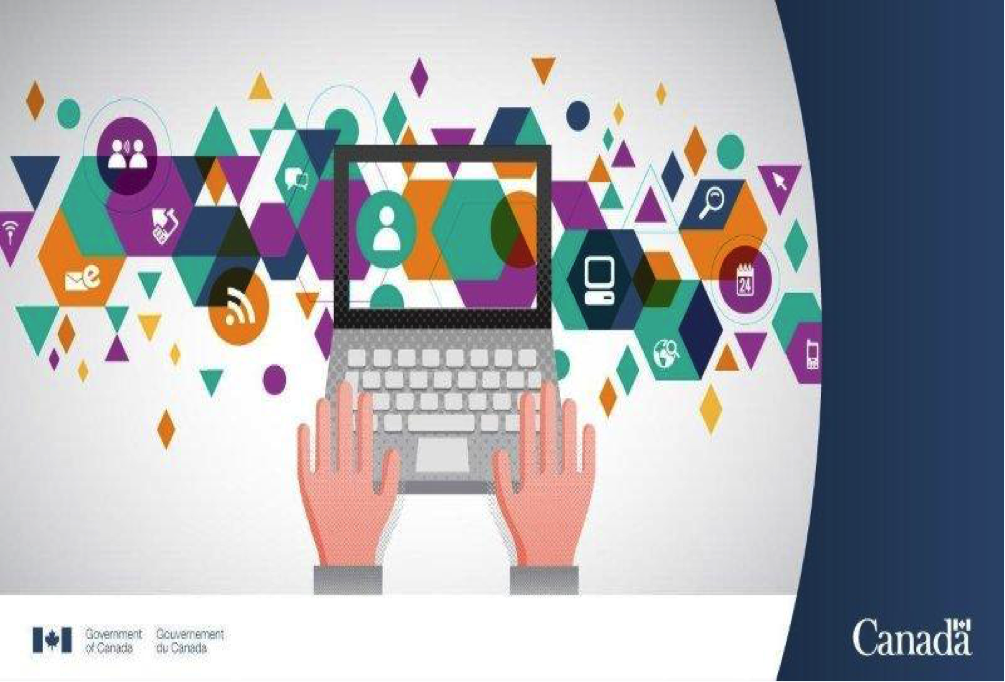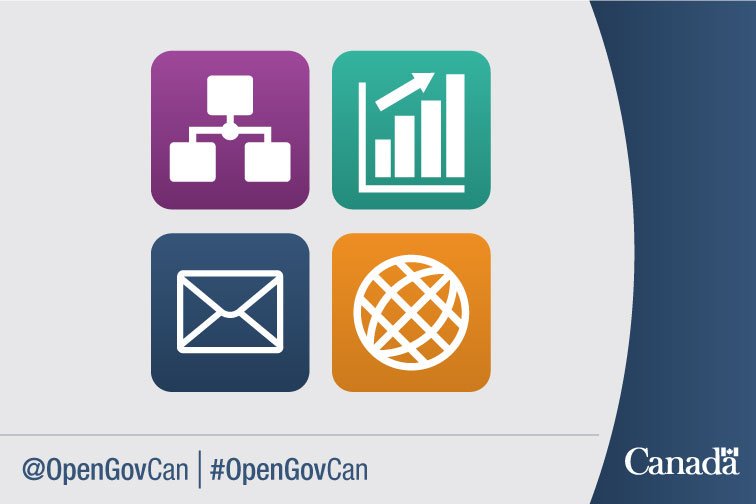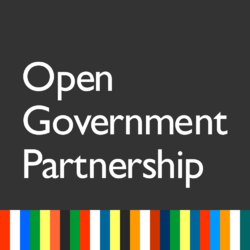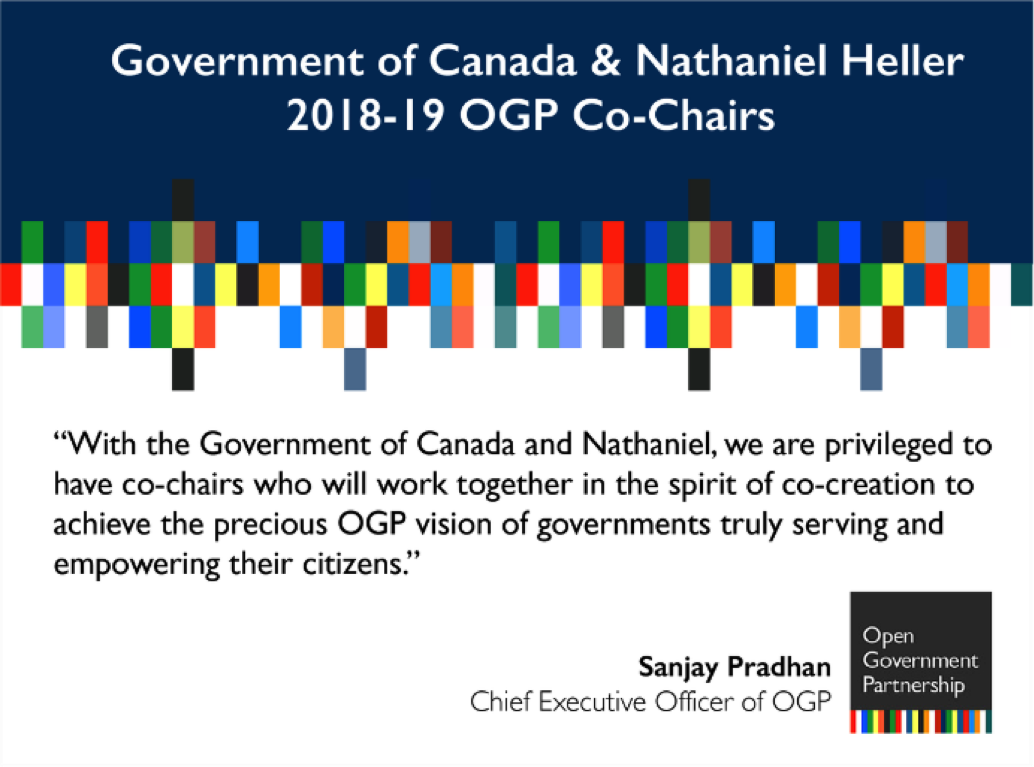Important: The GCConnex decommission will not affect GCCollab or GCWiki. Thank you and happy collaborating!
Difference between revisions of "Sandbox"
| Line 2: | Line 2: | ||
[[File:Opengovcan6.jpg|580px|thumb]] | [[File:Opengovcan6.jpg|580px|thumb]] | ||
<br><br><br><br><br><br><br><br><br><br><br><br><br><br><br><br><br><br><br><br> | <br><br><br><br><br><br><br><br><br><br><br><br><br><br><br><br><br><br><br><br> | ||
| − | < | + | <h2>[[What is open government?]]</h2> |
Open government is a new way of doing government that emphasizes transparency, accountability, and collaboration. More specifically, it attempts to improve democracy by including citizens in decision-making processes, engaging in proactive disclosure, using open data, information, and technology to spark innovation, and working collaboratively across government and civil society through open dialogue. | Open government is a new way of doing government that emphasizes transparency, accountability, and collaboration. More specifically, it attempts to improve democracy by including citizens in decision-making processes, engaging in proactive disclosure, using open data, information, and technology to spark innovation, and working collaboratively across government and civil society through open dialogue. | ||
| − | + | This is done within Canada and abroad through the Open Government Partnership (OGP), an international coalition consisting of over 75 member-nations attempting to make government more open and accessible for all. | |
| − | This is done within Canada and abroad through the Open Government Partnership (OGP), an international coalition consisting of over 75 member-nations attempting to make government more open and accessible for all. | + | <h2>[[Open Government Partnership]]</h2> |
| − | < | + | [[File:Opengovcan7.png|200px|thumb|left]]<br><br><br><br><br><br><br><br><br><br><br> |
| − | + | <h5>What is the OGP?</h5> | |
The Open Government Partnership (OGP) is a multilateral initiative whose goals are to foster greater transparency and accountability, improve governance, and increase civic engagement worldwide. OGP member-nations are expected to develop national action plans every two years. Plans must advance the principles of transparency, accountability, citizen participation, and technology and innovation. Through the OGP, governments have worked to develop innovative approaches to serving the public. They are making it easier to access government services and communicate with officials, and making valuable information readily available to the public.<br><br> | The Open Government Partnership (OGP) is a multilateral initiative whose goals are to foster greater transparency and accountability, improve governance, and increase civic engagement worldwide. OGP member-nations are expected to develop national action plans every two years. Plans must advance the principles of transparency, accountability, citizen participation, and technology and innovation. Through the OGP, governments have worked to develop innovative approaches to serving the public. They are making it easier to access government services and communicate with officials, and making valuable information readily available to the public.<br><br> | ||
| − | + | <h5>Canada and the OGP</h5> | |
Canada is active as a global leader on open government and joined the OGP in April 2012. Through this forum, Canada has both shared and learned from international best practices to advance priorities and standards for openness. Canada provided guidance to countries around the world through its chairing of the OGP’s Open Data Working Group, and spearheaded the development of common open data principles and standards for worldwide adoption. In 2018, Canada was ranked 1st in the world, along with the UK, by the World Wide Web Foundation’s Open Data Barometer which measures countries’ readiness to implement open data initiatives, their progress in implementing open data, and the results they are achieving using open data.<br><br> | Canada is active as a global leader on open government and joined the OGP in April 2012. Through this forum, Canada has both shared and learned from international best practices to advance priorities and standards for openness. Canada provided guidance to countries around the world through its chairing of the OGP’s Open Data Working Group, and spearheaded the development of common open data principles and standards for worldwide adoption. In 2018, Canada was ranked 1st in the world, along with the UK, by the World Wide Web Foundation’s Open Data Barometer which measures countries’ readiness to implement open data initiatives, their progress in implementing open data, and the results they are achieving using open data.<br><br> | ||
| − | + | <h5>Canada’s Co-Chairmanship of the OGP</h5> | |
| − | + | [[File:Opengovcan4.png||450px|thumb|left]]<br><br><br> | |
Canada is currently the lead government chair of the OGP along with civil society chair, Nathaniel Heller. Canada assumed its leadership role in October 2018 and will hold it until the following year. The Honourable Scott Brison, President of the Treasury Board and Minister of Digital Government, represents Canada in its role as co-chair. Canada’s leadership is focusing on three priorities: | Canada is currently the lead government chair of the OGP along with civil society chair, Nathaniel Heller. Canada assumed its leadership role in October 2018 and will hold it until the following year. The Honourable Scott Brison, President of the Treasury Board and Minister of Digital Government, represents Canada in its role as co-chair. Canada’s leadership is focusing on three priorities: | ||
Inclusion of marginalized or under-represented groups in policy making | Inclusion of marginalized or under-represented groups in policy making | ||
Participation of citizens in policy making | Participation of citizens in policy making | ||
Impact of global open government efforts; making it easier for citizens to understand how our work in open government affects their day-to-day lives | Impact of global open government efforts; making it easier for citizens to understand how our work in open government affects their day-to-day lives | ||
| − | As part of its co-chairmanship, Canada will be hosting an Open Government Global Summit in Ottawa from May 29-31, 2019. | + | As part of its co-chairmanship, Canada will be hosting an Open Government Global Summit in Ottawa from May 29-31, 2019. <br><br><br><br><br><br><br><br> |
| − | < | + | <h2>Open Government Portal</h2> |
Canada’s Open Government Portal , open.canada.ca, is a one-stop shop for data and information on Government of Canada services, financials, national demographic information, maps, and more. The portal allows users to search extensive open data and open information records released by over 60 government departments and agencies. As part of one of the commitments in Canada’s Third Biennial Plan to the Open Government Partnership to “launch an online, federated, multi-jurisdictional open data search service in partnership with one or more provinces and territories”, users are able to search for the Government of Alberta datasets through the portal. | Canada’s Open Government Portal , open.canada.ca, is a one-stop shop for data and information on Government of Canada services, financials, national demographic information, maps, and more. The portal allows users to search extensive open data and open information records released by over 60 government departments and agencies. As part of one of the commitments in Canada’s Third Biennial Plan to the Open Government Partnership to “launch an online, federated, multi-jurisdictional open data search service in partnership with one or more provinces and territories”, users are able to search for the Government of Alberta datasets through the portal. | ||
The Open Government Portal also acts as a central hub for the release proactive disclosures for the Government of Canada. By proactively releasing information related to travel and hospitality expenses, contracting, grants and contributions, position reclassifications and founded wrongdoing, Canadians and Parliament are better able to hold the Government and public sector officials to account. | The Open Government Portal also acts as a central hub for the release proactive disclosures for the Government of Canada. By proactively releasing information related to travel and hospitality expenses, contracting, grants and contributions, position reclassifications and founded wrongdoing, Canadians and Parliament are better able to hold the Government and public sector officials to account. | ||
| − | < | + | <h2>[[Canada's 4th National Action Plan on Open Government]]</h2> |
It is expected that OGP Action Plans are co-created with civil society and reflect extensive citizen engagement. In creating Canada’s 4th National Action Plan, the Open Government team at TBS consulted with Canadians through in-person workshops, webinars, a questionnaire, social media, and on Open.Canada.ca. Almost 11,000 people participated between October 2017 and April 2018. | It is expected that OGP Action Plans are co-created with civil society and reflect extensive citizen engagement. In creating Canada’s 4th National Action Plan, the Open Government team at TBS consulted with Canadians through in-person workshops, webinars, a questionnaire, social media, and on Open.Canada.ca. Almost 11,000 people participated between October 2017 and April 2018. | ||
Based on the comments received, the Open Government team engaged with other government of Canada departments and came up with ten draft commitments. The draft commitments were posted on Google Docs in July 2018 for public consultation. Citizens were able to comment on each commitment and provide their input on how to make the plan better. During the public consultation period, a Feminist and Inclusion Peer Review was conducted as well. Following the consultation period, comments and feedback were incorporated to create a final action plan. | Based on the comments received, the Open Government team engaged with other government of Canada departments and came up with ten draft commitments. The draft commitments were posted on Google Docs in July 2018 for public consultation. Citizens were able to comment on each commitment and provide their input on how to make the plan better. During the public consultation period, a Feminist and Inclusion Peer Review was conducted as well. Following the consultation period, comments and feedback were incorporated to create a final action plan. | ||
The final plan, including information on the feminist and peer review, the google docs consultation, and the overall engagement process, will be published and available online in the coming weeks. | The final plan, including information on the feminist and peer review, the google docs consultation, and the overall engagement process, will be published and available online in the coming weeks. | ||
| − | < | + | <h2>[[Additional Resources]]</h2> |
[http://www.Open.Canada.ca/ Open.Canada.ca]<br> | [http://www.Open.Canada.ca/ Open.Canada.ca]<br> | ||
[https://www.youtube.com/watch?v=HJ1Zb3omv4o/ Video: What is Open Government?] <br> | [https://www.youtube.com/watch?v=HJ1Zb3omv4o/ Video: What is Open Government?] <br> | ||
Revision as of 16:34, 8 November 2018
What is open government?
Open government is a new way of doing government that emphasizes transparency, accountability, and collaboration. More specifically, it attempts to improve democracy by including citizens in decision-making processes, engaging in proactive disclosure, using open data, information, and technology to spark innovation, and working collaboratively across government and civil society through open dialogue. This is done within Canada and abroad through the Open Government Partnership (OGP), an international coalition consisting of over 75 member-nations attempting to make government more open and accessible for all.
Open Government Partnership
What is the OGP?
The Open Government Partnership (OGP) is a multilateral initiative whose goals are to foster greater transparency and accountability, improve governance, and increase civic engagement worldwide. OGP member-nations are expected to develop national action plans every two years. Plans must advance the principles of transparency, accountability, citizen participation, and technology and innovation. Through the OGP, governments have worked to develop innovative approaches to serving the public. They are making it easier to access government services and communicate with officials, and making valuable information readily available to the public.
Canada and the OGP
Canada is active as a global leader on open government and joined the OGP in April 2012. Through this forum, Canada has both shared and learned from international best practices to advance priorities and standards for openness. Canada provided guidance to countries around the world through its chairing of the OGP’s Open Data Working Group, and spearheaded the development of common open data principles and standards for worldwide adoption. In 2018, Canada was ranked 1st in the world, along with the UK, by the World Wide Web Foundation’s Open Data Barometer which measures countries’ readiness to implement open data initiatives, their progress in implementing open data, and the results they are achieving using open data.
Canada’s Co-Chairmanship of the OGP
Canada is currently the lead government chair of the OGP along with civil society chair, Nathaniel Heller. Canada assumed its leadership role in October 2018 and will hold it until the following year. The Honourable Scott Brison, President of the Treasury Board and Minister of Digital Government, represents Canada in its role as co-chair. Canada’s leadership is focusing on three priorities:
Inclusion of marginalized or under-represented groups in policy making
Participation of citizens in policy making
Impact of global open government efforts; making it easier for citizens to understand how our work in open government affects their day-to-day lives
As part of its co-chairmanship, Canada will be hosting an Open Government Global Summit in Ottawa from May 29-31, 2019.
Open Government Portal
Canada’s Open Government Portal , open.canada.ca, is a one-stop shop for data and information on Government of Canada services, financials, national demographic information, maps, and more. The portal allows users to search extensive open data and open information records released by over 60 government departments and agencies. As part of one of the commitments in Canada’s Third Biennial Plan to the Open Government Partnership to “launch an online, federated, multi-jurisdictional open data search service in partnership with one or more provinces and territories”, users are able to search for the Government of Alberta datasets through the portal. The Open Government Portal also acts as a central hub for the release proactive disclosures for the Government of Canada. By proactively releasing information related to travel and hospitality expenses, contracting, grants and contributions, position reclassifications and founded wrongdoing, Canadians and Parliament are better able to hold the Government and public sector officials to account.
Canada's 4th National Action Plan on Open Government
It is expected that OGP Action Plans are co-created with civil society and reflect extensive citizen engagement. In creating Canada’s 4th National Action Plan, the Open Government team at TBS consulted with Canadians through in-person workshops, webinars, a questionnaire, social media, and on Open.Canada.ca. Almost 11,000 people participated between October 2017 and April 2018. Based on the comments received, the Open Government team engaged with other government of Canada departments and came up with ten draft commitments. The draft commitments were posted on Google Docs in July 2018 for public consultation. Citizens were able to comment on each commitment and provide their input on how to make the plan better. During the public consultation period, a Feminist and Inclusion Peer Review was conducted as well. Following the consultation period, comments and feedback were incorporated to create a final action plan. The final plan, including information on the feminist and peer review, the google docs consultation, and the overall engagement process, will be published and available online in the coming weeks.
Additional Resources
Open.Canada.ca
Video: What is Open Government?
Open Government Twitter account
Canada’s Action Plan on Open Government 2012-2014
Canada’s Action Plan on Open Government 2014-2016
Canada’s Third Biennial Plan to the Open Government Partnership
Tracker for the Third Biennial Plan to the Open Government Partnership




